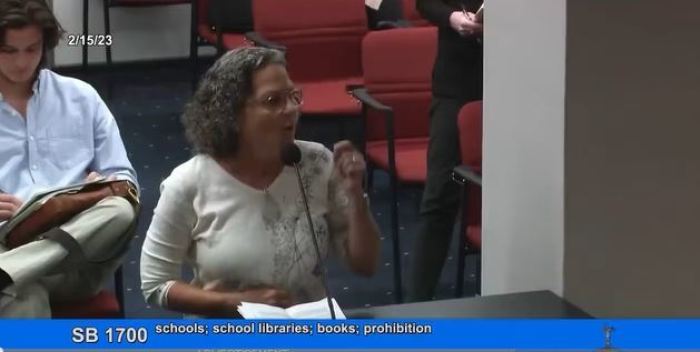'I have a master's degree': Teacher says it's a 'mistake' to let parents have a say in curriculum
ParentalRights.org tells CP the Parental Rights Amendment comes at a historic moment in 118th Congress

An Arizona teacher's comments at a state Senate Education Committee hearing have gone viral after she suggested that allowing parents to make decisions about what their children are taught is a “mistake.”
Special education teacher Alicia Messing of Phoenix made the comments during a Feb. 15 hearing on Senate Bill 1700, which would give parents oversight over the content their children are being taught amid concerns that students in public schools are being shown or given access to sexual content.
Among other things, SB1700 requires the Arizona Department of Education to maintain a “prohibited” book list that would ban any books included on the list from use at public schools or from being made available to students, including “books that are lewd or sexual, promote gender fluidity or gender pronouns or groom children into normalizing pedophilia.”
The bill also allows parents to petition the state's education department to categorize any “book the parent finds to be lewd or sexual in nature, promote gender fluidity or gender pronouns or groom children into normalizing pedophilia” as a prohibited book.
During the public comment portion of the Senate Education Committee meeting, Messing raised concerns about giving parents veto power over curriculum involving LGBT issues and other topics.
“I have a Masters degree! We all have advanced degrees! What have parents got? Are we vetting the background of parents?” ????
— AZSuburbs ???? (@noprezzie2012) February 16, 2023
Good bill @Wadsack4Arizona ????????#SB1700#ParentalRights#NoPornInSchoolshttps://t.co/boXaMWKA6qpic.twitter.com/6ONe1a688I
“I have a master’s degree because when I got certified, I was told I had to have a master’s degree to be an Arizona-certified teacher,” Messing said in the clip. “What do the parents have?”
Messing then appeared to suggest that parents and not teachers should be subject to background investigations and referred to students at public schools as “our children.”
“Are we vetting the backgrounds of our parents? Are we allowing the parents to choose the curriculum and the books that our children are going to read?” she said. “I think that it’s a mistake, and I am just speaking from the heart.”
Messing concluded with the following statement: “The one line that I love is we must remember that the purpose of public education is not to teach only what parents want their children to be taught, it is to teach them what society needs them to be taught.”
SB 1700 was passed by the Senate Education Committee and will head to a full vote in the state Legislature.
In 2021, Messing signed a pledge with more than 4,000 teachers from across the U.S. who vowed to continue teaching critical race theory (CRT) and other controversial curriculum regardless of whether it violated state law.
The “Pledge to Teach the Truth” opposed legislative efforts to “prohibit teachers from teaching the truth about this country: It was founded on dispossession of Native Americans, slavery, structural racism and oppression; and structural racism is a defining characteristic of our society today. … We, the undersigned educators, refuse to lie to young people about U.S. history and current events — regardless of the law.”
The fight for parental rights in public education has gained momentum since last October when Republicans in the U.S. House of Representatives introduced a constitutional amendment to protect parental rights amid heightened concerns about the state of American public education.
Introduced by Rep. Debbie Lesko, R-Ariz., the proposed amendment contains five sections, with one declaring that "the liberty of parents to direct the upbringing, education, and care of their children is a fundamental right."
The proposal also contends that "the parental right to direct education includes the right to choose, as an alternative to public education, private, religious, or home schools, and the right to make reasonable choices within public schools for one's child."
As a proposed constitutional amendment, the Parental Rights Amendment has a higher threshold to clear than most legislation before it can take effect. It must secure the support of two-thirds of the U.S. Senate and the House, and then three-fourths of the state Legislatures must ratify it.
The Parental Rights Amendment, crafted by the advocacy group ParentalRights.org, has been introduced in every session of Congress dating back to the 110th Congress, which convened from 2007-2008.
In an interview with The Christian Post, Will Estrada of ParentalRights.org and the Parental Rights Foundation said the bill comes at a historic moment.
"This is the first time that the amendment has been introduced when everybody across the country has been talking about parental rights," he said. "But the thing that's different this time is [parental rights] was not a high priority among the general population for the longest amount of time.
"That changed during the COVID-19 pandemic, when parents were home from work, working from home, when kids were doing Zoom school at the kitchen table and parents were disappointed ... with the quality of public education."
Ian M. Giatti is a reporter for The Christian Post. He can be reached at: ian.giatti@christianpost.com.















![[Ready to PUB] Christian psychologist: Kids must develop 'resilience' to fulfill God's purpose for them](https://cdn.christianpost.com/images/cache/thumbnail/25/92/259219_a_300_200_658_146.jpg)











